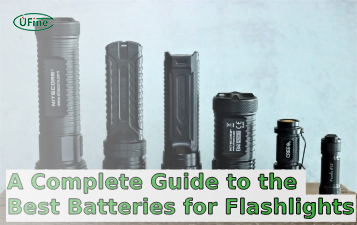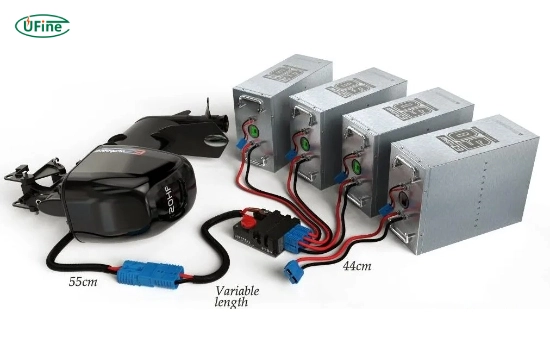
- Part 1. What is a battery outboard?
- Part 2. Why choose a lithium battery for outboard motor systems?
- Part 3. Lead-acid vs lithium: what's the real difference?
- Part 4. How to choose the right voltage and current?
- Part 5. What battery capacity do I need for my outboard?
- Part 6. Importance of waterproof and durable battery designs
- Part 7. How long do lithium outboard batteries last?
- Part 8. How Ufine designs custom marine battery solutions
- Part 9. Safety features to look for in a lithium outboard battery
- Part 10. How to charge and maintain your lithium marine battery?
- Part 11. FAQs about lithium battery for outboard motors
What is the best battery for outboard motors? The clear answer today is a lithium battery for outboard motor systems. These batteries are lighter, last longer, and deliver more power than traditional lead-acid options. Whether you’re powering a small fishing boat or a high-performance electric outboard, lithium batteries offer unmatched performance and efficiency. In this guide, we’ll explore everything you need to know about battery outboards, including how to choose the right lithium battery, how they compare to lead-acid batteries, and how custom solutions like those from Ufine can enhance your boating experience.
Part 1. What is a battery outboard?
A battery outboard refers to an electric outboard motor that draws power from an onboard battery pack instead of using gasoline. These systems are clean, quiet, and easy to maintain. They’re especially useful for lakes with fuel restrictions, eco-conscious boaters, and users who demand precision control and low-noise operation.
Electric outboards are powered by a dedicated outboard battery pack, which stores and delivers energy to the motor. The performance and range of your outboard depend directly on the quality and specifications of this battery system.
Part 2. Why choose a lithium battery for outboard motor systems?
Lithium batteries offer several key advantages compared to older battery technologies. Here’s why you should consider upgrading:
- Lighter weight: Lithium batteries are up to 70% lighter than lead-acid batteries.
- Faster charging: They recharge in a fraction of the time.
- Longer lifespan: A high-quality lithium battery can last over 2000 cycles.
- Consistent power: Voltage doesn’t drop off as the battery discharges.
- Eco-friendly: No harmful emissions or acid leaks.
These advantages make lithium the best option for anyone serious about marine performance.
Artikel Terkait: How Safe Are Battery Outboards?
Part 3. Lead-acid vs lithium: what’s the real difference?
Many boaters start with lead-acid batteries because they are cheap and widely available. However, lithium batteries outperform lead-acid in every key category.
| Feature | Lead-Acid Battery | Lithium Battery |
|---|---|---|
| Weight | Heavy | Lightweight |
| Charging Time | 6–10 hours | 2–4 hours |
| Lifespan (cycles) | 300–500 | 2000–4000 |
| Depth of Discharge | 50% | 80–90% |
| Maintenance | High (water levels, corrosion) | Low to zero |
| Performance at Low Voltage | Poor | Stable and strong |
If you want reliability, speed, and range on the water, lithium is the clear winner.
Part 4. How to choose the right voltage and current?
When selecting a lithium battery for outboard motor, you’ll need to match the battery voltage and current to your motor’s requirements.
- Voltage (V) determines how fast the motor spins.
- Current (A) defines how much power the motor can draw.
- Capacity (Ah) affects how long your battery lasts.
For example:
- A 12V 100Ah lithium battery might power a 30lb thrust trolling motor for several hours.
- A 48V 60Ah pack could efficiently run a 5kW electric outboard for a full afternoon.
Always check your motor’s specifications and choose a battery that meets or exceeds those numbers for optimal performance.
Part 5. What battery capacity do I need for my outboard?
Battery capacity, measured in amp-hours (Ah), determines how long your motor can run.
Here’s a simple formula:
Runtime (hours) = Battery Capacity (Ah) ÷ Current Draw (A)
So, if your motor draws 20 amps and you have a 100Ah battery:
100 ÷ 20 = 5 hours of runtime
Keep in mind that lithium batteries allow deeper discharge, meaning you can use more of the battery’s capacity without damaging it. This is a big advantage over lead-acid systems.
Our Battery Run Time and Capacity from Current & Time calculators help you choose the right lithium battery for your outboard motor — fast, accurate, and reliable.
Part 6. Importance of waterproof and durable battery designs
Marine environments are tough. Your outboard battery pack needs to resist water, salt, vibration, and temperature changes. That’s where IP ratings come in.
- IP67: Fully waterproof, even when submerged temporarily.
- IP68: Can handle continuous immersion.
Ufine specializes in custom lithium battery packs built with IP67/IP68 waterproof ratings, rugged enclosures, and advanced sealing technology. This ensures your battery performs safely and reliably in any marine condition.
Part 7. How long do lithium outboard batteries last?
Cycle life is a major advantage of lithium batteries. While lead-acid batteries often die after 300–500 cycles, lithium batteries can reach 2000–4000 cycles with proper care.
This means a lithium battery can easily last 5–10 years, even under regular use. That’s a major return on investment for serious boaters who want long-term reliability.
Part 8. How Ufine designs custom marine battery solutions
Ufine is a trusted leader in custom lithium battery design. Our engineering team works closely with clients to create tailor-made solutions for marine applications.
Key features include:
- Custom voltage and capacity options
- Advanced BMS (Battery Management System) for safety
- IP67/IP68 waterproof housings
- Compact and lightweight designs
- High energy density cells
- Marine-grade connectors and cables
Whether you’re building an electric pontoon or a high-speed RIB, Ufine can build a battery that fits your exact needs.
Part 9. Safety features to look for in a lithium outboard battery
Safety is critical on the water. High-quality lithium batteries include built-in protections such as:
- Overcharge protection
- Over-discharge protection
- Short-circuit protection
- Temperature control
- Cell balancing
A premium outboard battery pack will include a smart BMS to monitor and regulate all battery functions in real time.
Ufine’s marine batteries are built with these protections from the ground up, giving you peace of mind during every trip.
Part 10. How to charge and maintain your lithium marine battery?
Charging your lithium battery for outboard motor is easy, but using the right charger is important.
- Use a charger matched to your battery’s voltage (12V, 24V, 48V).
- Choose a smart charger with lithium charging profiles.
- Avoid overcharging or deep discharging.
- Store your battery partially charged in a cool, dry place.
Unlike lead-acid batteries, lithium batteries don’t require top-ups or regular maintenance. Just charge and go.
Part 11. FAQs about lithium battery for outboard motors
Can I replace my lead-acid battery with a lithium battery?
Yes. Most modern lithium batteries are designed to be drop-in replacements for lead-acid systems. Just ensure voltage and size match.
How long will a lithium battery run my outboard motor?
Runtime depends on battery capacity and motor power. A 100Ah battery on a 20A motor could run for around 5 hours.
Are lithium batteries safe for marine use?
Absolutely. High-quality lithium batteries with built-in protections and waterproof designs are safe for all marine environments.
What is the best voltage for a battery outboard?
It depends on your motor. Smaller trolling motors use 12V, while high-power outboards often require 24V or 48V systems.
Can I charge my lithium outboard battery with solar panels?
Yes. Just make sure your solar charge controller supports lithium batteries and matches the system voltage.
Related Tags:
More Articles

A Complete Guide to the Best Batteries for Flashlights
Compare the best batteries for flashlights, including AA, AAA, 18650, 21700, CR123A. See which battery offers the best brightness, runtime, and reliability.
How Long Do Rechargeable AA Batteries Last?
How long do rechargeable AA batteries last? Compare NiMH and lithium AA lifespan, recharge cycles, key factors, and performance vs alkaline batteries.
How Much Current Can a 9V Battery Really Supply?
Discover how many amps a 9V battery can supply, its actual current output, discharge rate, and capacity for alkaline, lithium, and rechargeable 9V batteries.
12V STD vs 12V AGM: Meaning, Differences, and Which Is Better
Understand what STD and AGM batteries mean, their key differences, and which 12V battery fits your needs best in 2026.
Battery Reconditioning Explained: A Comprehensive Guide
Learn what battery reconditioning is, how it works, how long it takes, and when reconditioning chargers are used for lead-acid and lithium-ion batteries.



